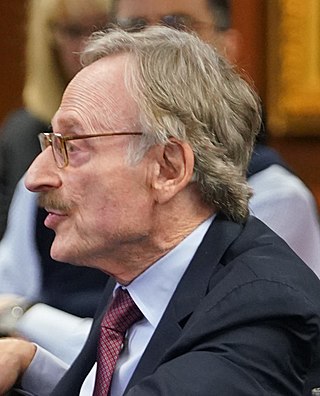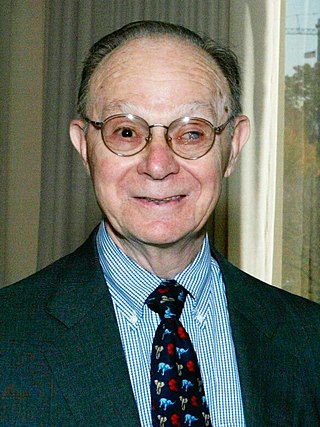
James Joseph Heckman is a Nobel Memorial in Economic Sciences Prize-winning American economist at the University of Chicago, where he is The Henry Schultz Distinguished Service Professor in Economics and the College; Professor at the Harris School of Public Policy; Director of the Center for the Economics of Human Development (CEHD); and Co-Director of Human Capital and Economic Opportunity (HCEO) Global Working Group. He is also Professor of Law at the Law School, a senior research fellow at the American Bar Foundation, and a research associate at the National Bureau of Economic Research. In 2000, Heckman shared the Nobel Memorial Prize in Economic Sciences with Daniel McFadden, for his pioneering work in econometrics and microeconomics. As of December 2020, according to RePEc, he is the second-most influential economist in the world.
An economist is a professional and practitioner in the social science discipline of economics.

Edward Christian Prescott was an American economist. He received the Nobel Memorial Prize in Economics in 2004, sharing the award with Finn E. Kydland, "for their contributions to dynamic macroeconomics: the time consistency of economic policy and the driving forces behind business cycles". This research was primarily conducted while both Kydland and Prescott were affiliated with the Graduate School of Industrial Administration at Carnegie Mellon University. According to the IDEAS/RePEc rankings, he was the 19th most widely cited economist in the world in 2013. In August 2014, Prescott was appointed an Adjunct Distinguished Economic Professor at the Australian National University (ANU) in Canberra, Australia. Prescott died of cancer on November 6, 2022, at the age of 81.
Nancy Laura Stokey has been the Frederick Henry Prince Distinguished Service Professor of Economics at the University of Chicago since 1990 and focuses particularly on mathematical economics while recently conducting research about Growth Theory, economic dynamics, and fiscal/monetary policy. She earned her BA in economics from the University of Pennsylvania in 1972 and her PhD from Harvard University in 1978, under the direction of thesis advisor Kenneth Arrow. She is a Fellow of the Econometric Society, the American Academy of Arts and Sciences and the National Academy of Sciences. She previously served as a co editor of Econometrica and was a member of the Expert Panel of the Copenhagen Consensus. She received her Honorary Doctor of Laws (L.L.D) in 2012 from the University of Western Ontario. Much of her work has been done by digesting economic dynamics, which most of this work is done as an expositor. She spent a great deal of time recently researching growth theory, economic dynamics, as well as fiscal and monetary policy.

David Edward Card is a Canadian-American labour economist and the Class of 1950 Professor of Economics at the University of California, Berkeley, where he has been since 1997. He was awarded half of the 2021 Nobel Memorial Prize in Economic Sciences "for his empirical contributions to labour economics", with Joshua Angrist and Guido Imbens jointly awarded the other half.

The Federal Reserve Bank of St. Louis is one of 12 regional Reserve Banks that, along with the Board of Governors in Washington, D.C., make up the United States' central bank. Missouri is the only state to have two main Federal Reserve Banks. Located in downtown St. Louis, the St. Louis Fed is the headquarters of the Eighth Federal Reserve District, which includes the state of Arkansas and portions of Illinois, Indiana, Kentucky, Mississippi, the eastern half of Missouri and West Tennessee. It has branches in Little Rock, Louisville and Memphis. Its building, at 411 Locust Street, was designed by St. Louis firm Mauran, Russell & Crowell in 1924. The Eighth District serves as a center for local, national and global economic research, and provides the following services: supervisory and regulatory services to state-member banks and bank holding companies; cash and coin-handling for the District and beyond; economic education; and community development resources.

Michael Jay Boskin is the T. M. Friedman Professor of Economics and senior Fellow at Stanford University's Hoover Institution. He also is chief executive officer and president of Boskin & Co., an economic consulting company.

Lawrence Henry White is an American economics professor at George Mason University who teaches graduate level monetary theory and policy. He is considered an authority on the history and theory of free banking. His writings support the abolition of the Federal Reserve System and the promotion of private and competitive banking.

Randall S. Kroszner is an American economist who served as a member of the Federal Reserve Board of Governors from 2006 to 2009. Kroszner chaired Fed's board Committee on Supervision and Regulation of Banking Institutions during the global financial crisis. He has been professor of economics at the University of Chicago since the 1990s, with various leaves, and named Norman R. Bobins Professor of Economics at the University of Chicago Booth School of Business in 2009, and serves as a senior advisor for Patomak Partners.

Allan H. Meltzer was an American economist and Allan H. Meltzer Professor of Political Economy at Carnegie Mellon University's Tepper School of Business and Institute for Politics and Strategy in Pittsburgh, Pennsylvania. Meltzer specialized on studying monetary policy and the US Federal Reserve System, and authored several academic papers and books on the development and applications of monetary policy, and about the history of central banking in the US. Together with Karl Brunner, he created the Shadow Open Market Committee: a monetarist council that deeply criticized the Federal Open Market Committee.

William Poole was the eleventh chief executive of the Federal Reserve Bank of St. Louis. He took office on March 23, 1998 and began serving his full term on March 1, 2001. In 2007, he served as a voting member of the Federal Open Market Committee, bringing his District's perspective to policy discussions in Washington. Poole stepped down from the Fed on March 31, 2008.
The National Association for Business Economics (NABE) is the largest international association of applied economists, strategists, academics, and policy-makers committed to the application of economics. Founded in 1959, it is one of the member organizations of the Allied Social Science Associations. According to the association's website, "NABE's mission is to provide leadership in the use and understanding of economics.".
The American Society of Hispanic Economists (ASHE) is a professional association of economists in the United States that promotes the representation of Hispanic Americans within the economics profession and supports economic research relevant to Hispanic Americans. ASHE is recognized by the American Economic Association as one of the academic organizations comprising the Allied Social Sciencs Associations.

Carlos A. Végh is a Uruguayan academic economist who, since 2013, is the Fred H. Sanderson Professor of International Economics at the Johns Hopkins School of Advanced International Studies (SAIS), and holds a joint appointment with Johns Hopkins' Department of Economics. He is also a research associate at the National Bureau of Economic Research since 1998. He was the World Bank Chief Economist for Latin America and the Caribbean from February 1, 2017 to June 30, 2019, while on leave from Johns Hopkins. He was previously a Professor of Economics and Vice-Chair of Undergraduate Studies at UCLA (1996-2005) and Professor of Economics at the University of Maryland (2005-2013). His research work on monetary and fiscal policy in emerging and developing countries has been highly influential in both academic and policy circles. In particular, his work on fiscal procyclicality in emerging markets has been instrumental in generating a copious literature on the subject, which has influenced the adoption of fiscal rules in many emerging markets.

David Richard Henderson is a Canadian-born American economist and author who moved to the United States in 1972 and became a U.S. citizen in 1986, serving on President Ronald Reagan's Council of Economic Advisers from 1982 to 1984. A research fellow at Stanford University's Hoover Institution since 1990, he took a teaching position with the Naval Postgraduate School in Monterey, California in 1984, and is now an emeritus professor of economics.

William A. Darity Jr. is an American economist and social sciences researcher. Darity's research spans economic history, development economics, economic psychology, and the history of economic thought, but most of his research is devoted to group-based inequality, especially with respect to race and ethnicity. His 2005 paper in the Journal of Economics and Finance established Darity as the 'founder of stratification economics.' His varied research interests have also included the trans-Atlantic slave trade, African American reparations and the economics of black reparations, and social and economic policies that affect inequities by race and ethnicity. For the latter, he has been described as "perhaps the country’s leading scholar on the economics of racial inequality."

Erica Lynn Groshen is the former Commissioner of Labor Statistics and head of the U.S. Bureau of Labor Statistics (BLS), the independent, principal fact-finding agency for the U.S. government in the broad fields of labor economics and statistics, inflation, and productivity. BLS is part of the U.S. Department of Labor.

Thomas MacGillivray Humphrey is an American economist. Until 2005 he was a research advisor and senior economist in the research department of the Federal Reserve Bank of Richmond and editor of the Bank's flagship publication, the Economic Quarterly. His publications cover macroeconomics, monetary economics, and the history of economic thought. Mark Blaug called him the "undisputed master" of British classical monetary thought.
Robert A. Pollak is an economist. Pollak has made contributions to the specification and estimation of consumer demand systems, social choice theory, the theory of the cost of living index, and since the early 1980s, to the economics of the family and to demography. He is currently the Hernreich Distinguished Professor of Economics at Washington University in St. Louis, holding joint appointments in the Faculty of Arts & Sciences and in the Olin Business School.
Eric Baird French is the Montague Burton Professor of Industrial Relations and Labour Economics at the University of Cambridge. He is also a Co-Director at the ESRC Centre for the Microeconomic Analysis of Public Policy, a Fellow at the Institute for Fiscal Studies and a Fellow at the Centre for Economic Policy Research. His research interests include: econometrics, labour and health economics.













